How to Choose Between Buying vs. Renting a Trailer
April 17th, 2020
When you’re in the market for a new commercial trailer, you have many options: dry vans, dumps, lowboys, reefers, flatbeds, and more. On top of deciding which type of trailer is best, you also have to choose between buying vs. renting a trailer.
As a fleet manager or owner/operator, you want to make a wise investment based on your needs that will offer your team and your customers the best solutions. That means thinking about factors like:
- Type of freight you move
- What region and terrain your fleet travels within
- Special technology needs
- How often a trailer is used
- Budget
- Insurance
If you’re still deciding between buying vs. renting a trailer, this guide will help you determine the most cost-effective and beneficial option. Purchasing a trailer is a big decision and it’s important to weigh all the pros and cons before making a big investment. If you’re considering a trailer rental, we’ll share a few important tips to make sure renting fits your needs.
What is Your Commercial Fleet Responsible For?
One of the first questions you need to ask before deciding to buy or rent a commercial trailer is what your fleet is responsible for. If you are an owner/operator, and don’t have a large fleet, you still need a good understanding of what you’ll be using the trailer for prior to making a decision, especially if you’re investing your own money. The following sections will discuss how freight type, region, and technology considerations may affect your decision to buy vs. rent a trailer.
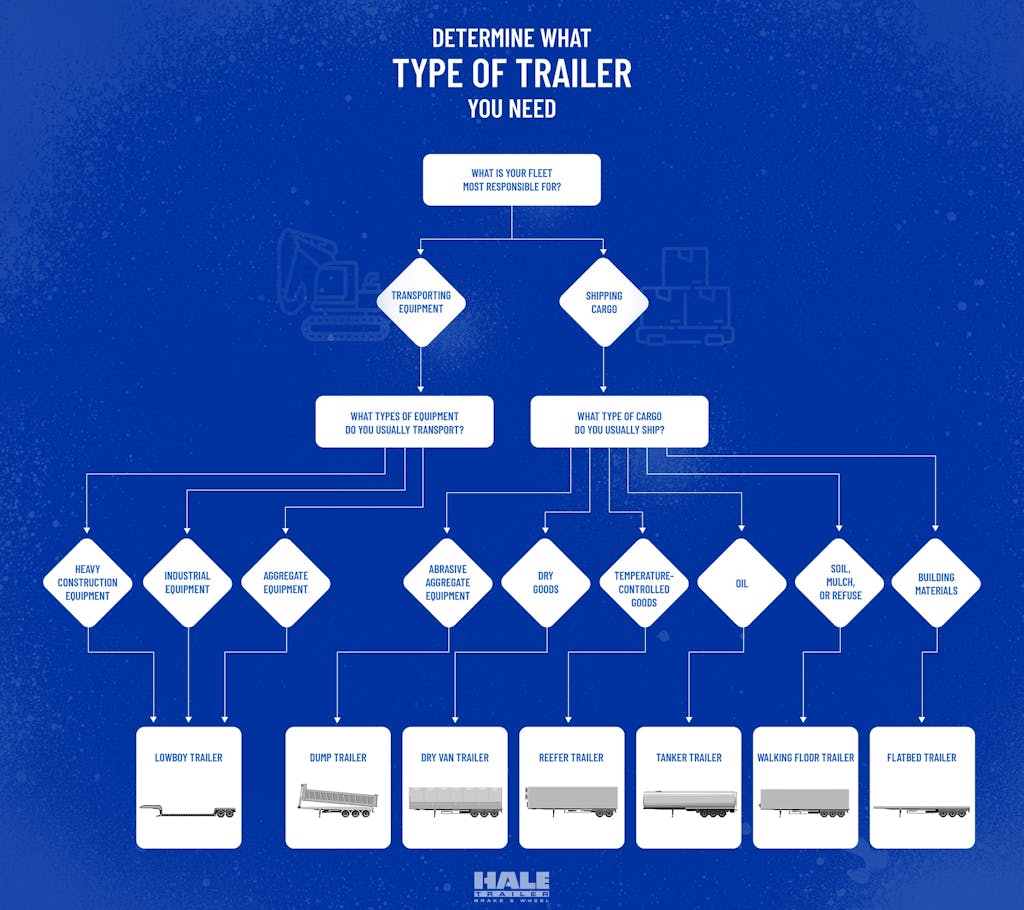
Freight Type Affects Trailer Choice
The type of freight you typically haul is probably the biggest consideration when choosing the type of trailer you need. If you’re moving the same type of freight frequently, you’ll want to factor that in, as purchasing a trailer for regular use may be a better long-term investment. The following are common trailers and freight:
- Dry Vans: Non-perishable food and beverage, textiles, plastics, cars, housing relocation
- Reefer: Any freight that needs to be temperature controlled, such as pharmaceuticals, perishable foods and beverages, and tobacco products
If you’re moving different freight all the time, it may not be useful to own a reefer, but instead to rent a reefer trailer.
- Tankers: Liquids, gases, chemicals, fuel
- Hopper Bottom: Ideal for shipping food products, such as loose grain, legumes and nuts
- Dump: Aggregate, such as rocks, gravel, sand, or garbage, metal, and other construction materials
- Lowboy: Tall, heavy, or wide equipment, such as excavators
If you’re considering renting or buying a commercial trailer, ask which one of the above trailers suits your needs most often. If you’re moving different freight all the time, it may not be useful to own a reefer, for example. By investing in one type of trailer, you may limit your options, especially if you’re an owner/operator that doesn’t have a fleet.
How Often Do You Move Freight
It’s not just what you’re moving, but how often, too. If you’re a fleet manager, you help coordinate multiple trucks and trailers, but how often are those trailers actually being used? If your fleet moves dry goods every week, purchasing a trailer is a good investment. If it’s a couple times a year, it may be better to rent when you need it.
Technology Makes Transportation More Efficient
Trailers and trucks are often manufactured with advanced technology that lends to more efficiency, better safety, and successful deliveries. Whether your renting or purchasing a trailer, you may want to seek out technology that contributes to your hauls. Here are some common technologies found in newer trailers:
- Trailer tracking: GPS that tells fleet managers where the trailer is at all times, in addition to transmitting data back to a fleet management system (FMS). Trailer tracking can also help fleets save money by reducing trailer down time.
- Temperature tracking: If you’re moving perishable goods, you are required to stay compliant with local and federal regulations. Temperature tracking helps to produce accurate documentation about every load for audit purposes and as record of your credibility to shippers.
- Anti-Corrosion: New trailer coatings and aluminum trailer construction help prevent corrosion.
- Trailer wheel sensors: These sensors help monitor miles, weight, inflation, and integrate with the braking system for improved safety.
Not each of these features is necessary but may be a good investment in the future. Renting a trailer may be a good way to try out some of the recent technology to decide if buying a commercial trailer with those features is worthwhile.
Where Does Your Fleet Travel?
If you drive or manage a fleet that drives in certain regions, it may affect the type of trailer you rent or buy and may also affect your decision between buying vs. renting a trailer. Here a few common route considerations:
- Types of roads: Highways, 2-lane roads, rough terrain, city, mountains, damaged roads. Trailers can be outfitted to perform better in certain road environments, making your hauls more efficient and safer.
- Weather: Rain, snow, heat, cold–if your fleet is hauling through extreme weather conditions regularly, you’ll want to rent to buy a trailer that’s well-suited for those conditions.
- Distance: Are you hauling locally, or making longer, interstate journeys? There may be compliance issues to consider, in addition to trailer technology that helps with efficiency such as a rented reefer trailer to keep perishables at the right temperatures.
- State/Local/Federal regulations: If you typically only haul intrastate, you can rely on a set of trailers that adhere to your state laws. If you have an occasional or one-time need in another region, it may be better to rent a trailer, rather than purchase a trailer.
Ultimately, renting vs. buying a trailer comes down to your specific needs. Taking time to assess how and where your fleet travels is a great place to begin when choosing the best trailer options.
When Should You Buy a Commercial Trailer?
You now have an idea of the most important things to look out for before buying or renting a trailer, so how do you know which route to take? The following sections will discuss the benefits of each, how to purchase or rent, and most importantly, how each affects your bottom line.
Benefits of Purchasing a Trailer
Purchasing a trailer is often the best decision from a long-term investment standpoint. Factors like ROI, trailer availability, maintenance options, and tax advantages are all good reasons to seriously consider buying a trailer. Let’s dig in a little deeper to find out why a trailer purchase may be your best bet.
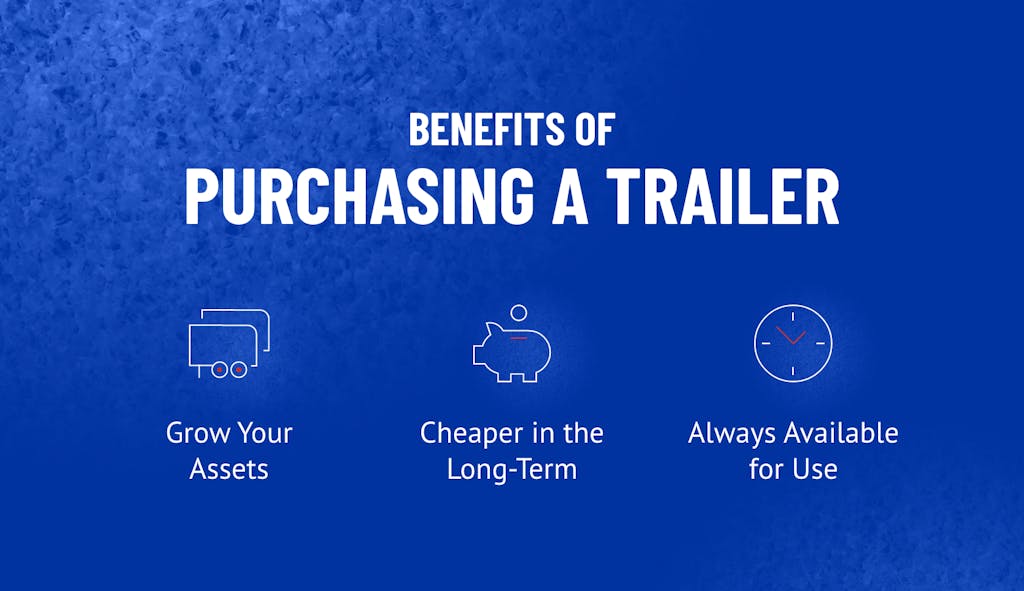
1. Grow Your Assets
When you purchase a trailer, you are adding to your existing fleet assets. This offers a number of benefits, but one of the top ones is that you have an asset that can be sold or leased later on. If a trailer is no longer being used regularly, you have the freedom to sell or lease the trailer, thus getting a return on your initial investment.
Buying a commercial trailer is most beneficial for fleet managers who oversee a large fleet. Trailer turnover is more common, and thus, more helpful to have the flexibility to purchase, sell, and lease in a way that benefits the most.
2. Cheaper in the Long-Term
When you purchase a trailer, you often avoid pre- and post-rental fees and the stress of seeking out the right rental. You also gain some tax advantages that may benefit over the long-term vs. just for that year.
When you purchase a trailer, you can take what’s called a depreciation deduction. You can spread it out over a period of years or receive the tax write-off in a single year. For example, if you make a $60,000 purchase in 2020, you can write-off that entire amount in that year, or take a $10,000 per year deduction over the next six years. Considering these tax advantages, it may be cheaper to buy a trailer than rent, especially if you’re getting good use from the trailer.
Trailers often last up to 20 years when the financing is only 5 to 7 years. That gives you over 10 years of payment-free use, which results in far higher ROI than a rental.
3. Always Available for Use
When it comes to buying vs. renting a trailer, one of the biggest advantages is having the trailer available whenever you need it. You are not bound by rental agreements and other limitations, saving time from the procurement process. If there is a last-minute need, or a trailer breaks down, you have confidence knowing that your fleet is well-stocked with other options.
Tips for Purchasing a Trailer
Purchasing a trailer may seem overwhelming. There are a number of options to consider, including various features, freight considerations, new vs. used trailers, and of course, the cost.
To help you understand the purchasing process, here are a few tips:
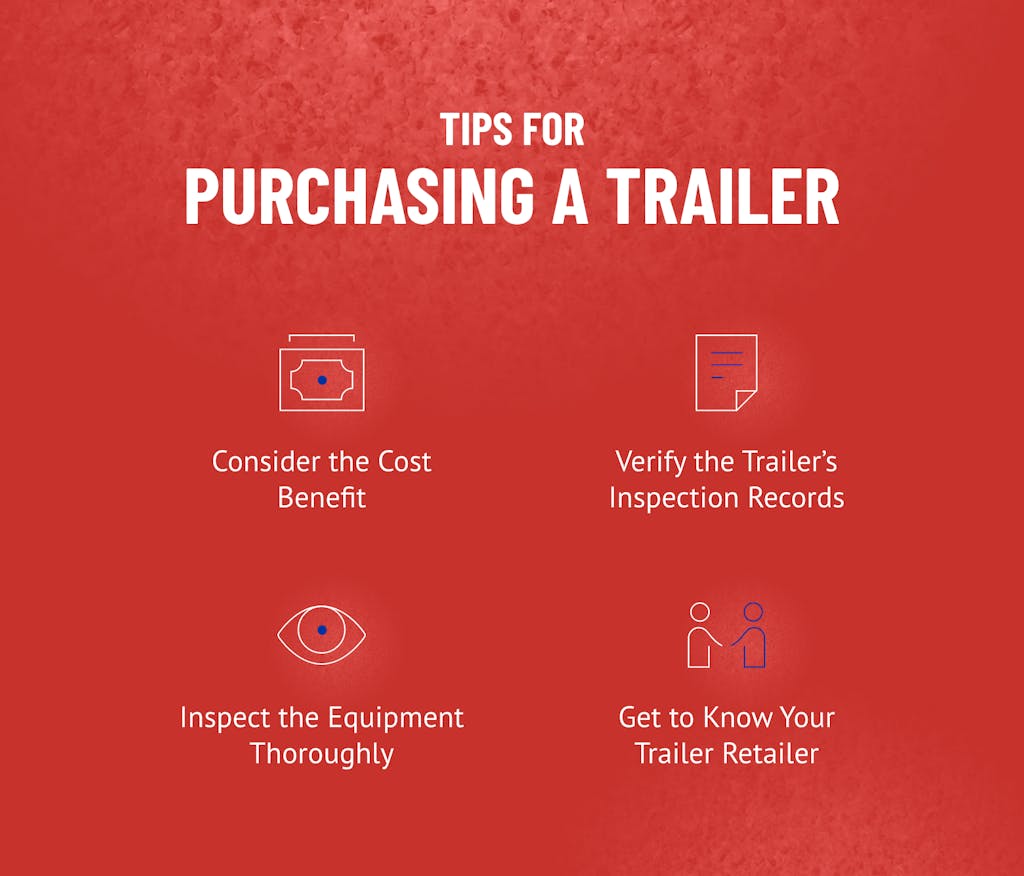
1. Consider the Cost Benefit
If you know which trailer you need and why, the decision likely comes down to the cost of buying vs. renting a trailer. If you have the capital to purchase a trailer, it is usually the best option, unless you only need the trailer for a short-term rental. Weighing the monthly cost of ownership, like loan payments, insurance, interest, and maintenance, versus a rental will help you decide if the investment is worth it.
2. Inspect the Equipment Thoroughly
Before renting or buying a trailer, you’ll want to do a thorough inspection of the trailer and its components. Doing a good check will ensure that you’re making a wise investment on a quality trailer, saving you hassle later on.
Here a few items to check before renting or purchasing a trailer:
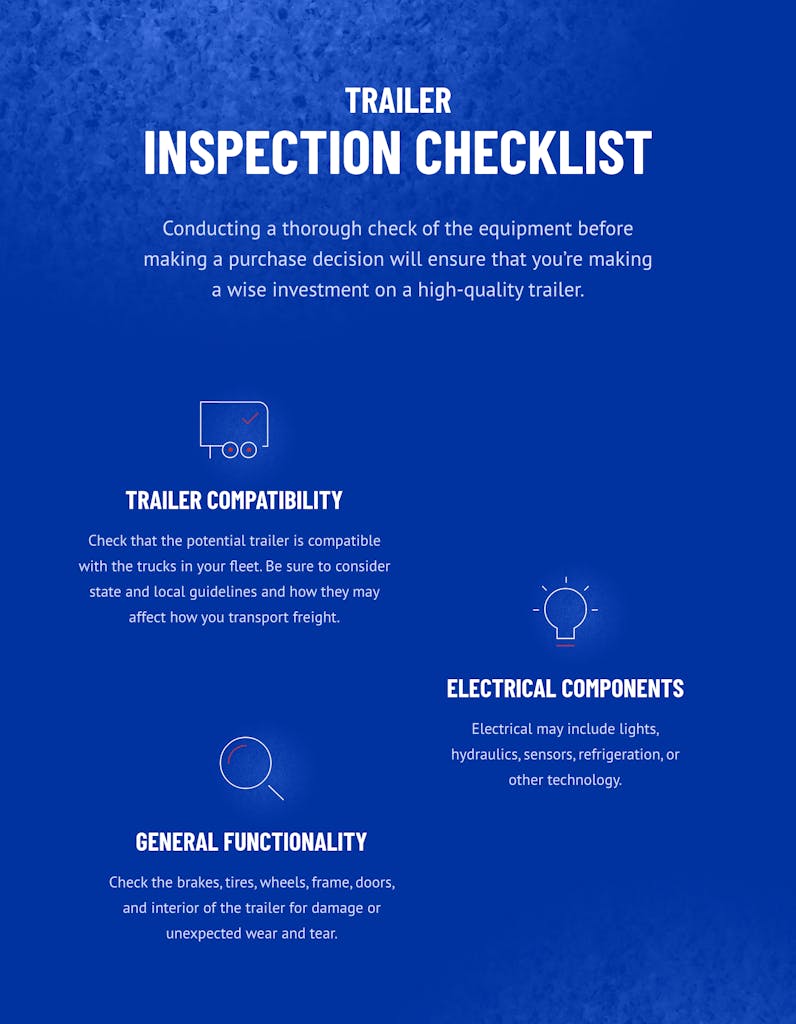
- Trailer compatibility: Check that any potential trailer purchase is compatible with the trucks in your fleet. There are U.S. Department of Transportation guidelines, as well as state and local guidelines that may affect how you move freight based on weight and length.
- Electrical components: Electrical may include lights, hydraulics, sensors, refrigeration, or other technology.
- General functionality: Check brakes, tires, wheels, metal or aluminum frame, doors, and interior of trailer for damage, especially if you’re purchasing a used trailer.
- Fifth wheel connection: Ensure that your truck’s fifth wheel is compatible and connects properly with the trailer.
- Pony motor or wet kit requirements: Make note of whether the trailer has a pony motor, or if it will require a wet kit to power the hydraulic system.
3. Verify the Trailer’s Inspection Records
If you’re purchasing a used trailer, be sure to check maintenance and inspection records. Trailers need to have regular inspections done and you want to ensure that the trailer is free of incidents that could affect its performance.
4. Get to Know Your Trailer Retailer
If you’re a fleet manager, it’s helpful to build relationships with different trailer retailers before purchasing a trailer. Knowledgeable representatives have experience with different manufacturers, service requirements, regulations, uses, and even the reputation certain models have. They can help save you time during the search process and offer helpful advice to steer you towards the best trailer option.
When Should You Rent a Commercial Trailer?
If you’re not ready to purchase a trailer, renting may be a great option. Fleet managers and owner/operators may choose a rental if:
- You need a storage trailer for a short period of time
- Your company wants to show rental expenses for tax purposes
- Need trailer for a short-term contract, say for hauling a single load on a rented flatbed
- Need specific technology, but not ready to invest long-term
The following sections will explain the benefits of renting so that you can make a confident decision about your next trailer.
Benefits of Renting a Trailer
Renting a trailer offers a number of benefits to fleet managers and owner/operators, which include:
- Seasonal needs
- New accounts or routes that aren’t guaranteed long-term
- Maintenance and road service covered in rental agreement
- Specific trailer equipment needed for a short-term job
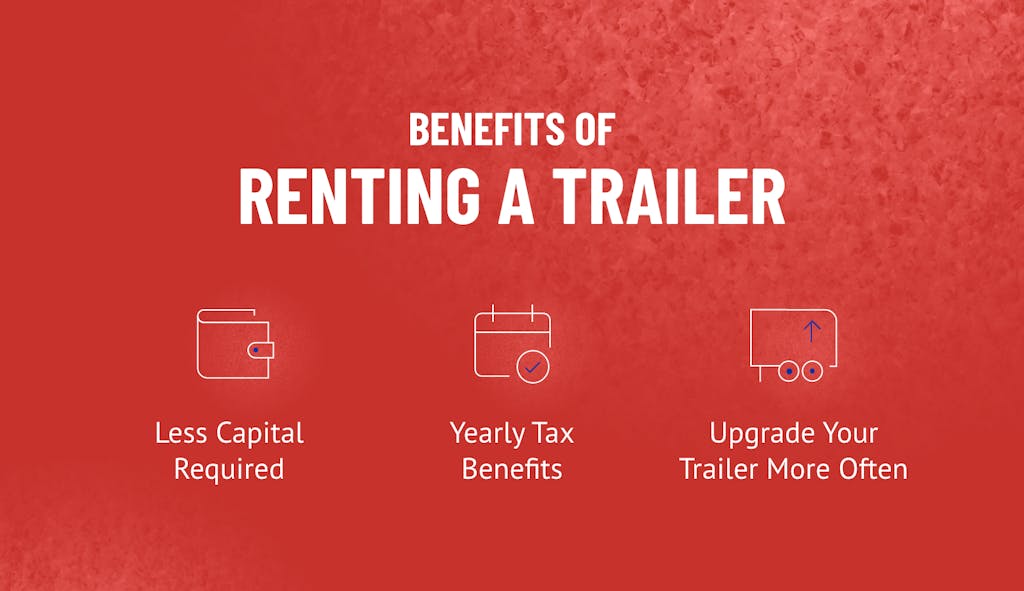
Less Capital Required
Renting may make it more affordable to use trailers that contain certain technology and features too expensive for a trailer purchase. If you or your company are not prepared with necessary capital to purchase a trailer, you can easily rent.
Yearly Tax Benefits with a Trailer Rental
Trailer rentals can still qualify for a tax benefit, but it is different than the benefit offered for a trailer purchase. If you rent a trailer, the business can deduct the rental fees as a business expense but can only apply them within that tax year.
You can Upgrade Your Trailer More Often
If your fleet’s needs are technology driven or you want the newest trailers on the market, rentals give you the opportunity to upgrade regularly. Be sure to discuss the rental or lease terms with your trailer provider to make sure you’re both aligned with the scope of the rental.
Making the Decision to Buy vs. Rent a Trailer

The decision to buy or rent a trailer isn’t black and white. While purchasing a trailer certainly offers you or your business a great long-term investment but isn’t always the best choice under short-term circumstances. Ultimately, the decision comes down to assessing the unique needs of your business, its fleet, freight, and where your travels take you.
If you need help making that big decision, Hale Trailer Brake & Wheel, Inc. is ready to help you. Our knowledgeable trailer experts understand the unique challenges for fleet managers and owner/operators, and the pros and cons of buying vs. renting a trailer.
Our 12 trailer rental and sales locations carry an extensive inventory of new and used commercial trailers in various types and manufacturers. We also offer service and parts, making us a one-stop shop for all your trailer needs. Contact us to learn more about making your next decision to buy or rent a trailer.
All the information on this website – https://www.haletrailer.com – is published in good faith and for general information purposes only. Hale Trailer Brake and Wheel does not make any warranties about the completeness, reliability and accuracy of this information. Any action you take upon the information you find on this website, is strictly at your own risk. Hale Trailer Brake and Wheel will not be liable for any losses and/or damages in connection with the use of our website.
